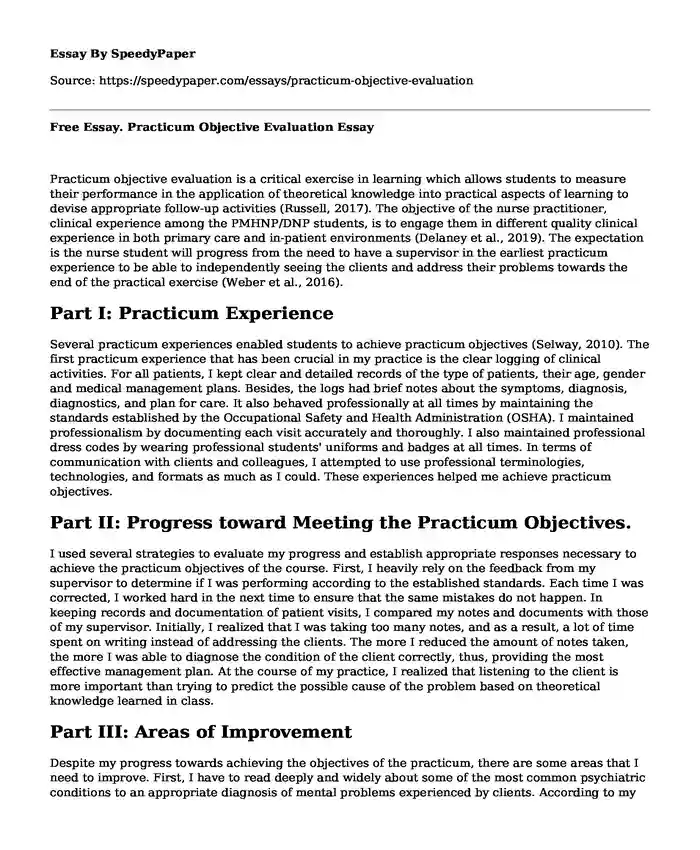
| Type of paper: | Essay |
| Categories: | Students Nursing care Special education |
| Pages: | 3 |
| Wordcount: | 770 words |
Practicum objective evaluation is a critical exercise in learning which allows students to measure their performance in the application of theoretical knowledge into practical aspects of learning to devise appropriate follow-up activities (Russell, 2017). The objective of the nurse practitioner, clinical experience among the PMHNP/DNP students, is to engage them in different quality clinical experience in both primary care and in-patient environments (Delaney et al., 2019). The expectation is the nurse student will progress from the need to have a supervisor in the earliest practicum experience to be able to independently seeing the clients and address their problems towards the end of the practical exercise (Weber et al., 2016).
Part I: Practicum Experience
Several practicum experiences enabled students to achieve practicum objectives (Selway, 2010). The first practicum experience that has been crucial in my practice is the clear logging of clinical activities. For all patients, I kept clear and detailed records of the type of patients, their age, gender and medical management plans. Besides, the logs had brief notes about the symptoms, diagnosis, diagnostics, and plan for care. It also behaved professionally at all times by maintaining the standards established by the Occupational Safety and Health Administration (OSHA). I maintained professionalism by documenting each visit accurately and thoroughly. I also maintained professional dress codes by wearing professional students' uniforms and badges at all times. In terms of communication with clients and colleagues, I attempted to use professional terminologies, technologies, and formats as much as I could. These experiences helped me achieve practicum objectives.
Part II: Progress toward Meeting the Practicum Objectives.
I used several strategies to evaluate my progress and establish appropriate responses necessary to achieve the practicum objectives of the course. First, I heavily rely on the feedback from my supervisor to determine if I was performing according to the established standards. Each time I was corrected, I worked hard in the next time to ensure that the same mistakes do not happen. In keeping records and documentation of patient visits, I compared my notes and documents with those of my supervisor. Initially, I realized that I was taking too many notes, and as a result, a lot of time spent on writing instead of addressing the clients. The more I reduced the amount of notes taken, the more I was able to diagnose the condition of the client correctly, thus, providing the most effective management plan. At the course of my practice, I realized that listening to the client is more important than trying to predict the possible cause of the problem based on theoretical knowledge learned in class.
Part III: Areas of Improvement
Despite my progress towards achieving the objectives of the practicum, there are some areas that I need to improve. First, I have to read deeply and widely about some of the most common psychiatric conditions to an appropriate diagnosis of mental problems experienced by clients. According to my supervisor's feedback, although all my diagnoses were correct, I had no confidence in my diagnostic abilities. Extensive reading will promote my confidence in dealing with patients. Secondly, I need to increase the pace at which I serve each client. My supervisor spends half the time I use to serve one patient. With the increase in the number of people with a mental health condition seeking psychiatric help, it is critical to serving as many patients as possible within the shortest time possible.
Conclusion
From the above discussion, it is evident that the practicum objective evaluation plays a critical role in enhancing the professional performance of PMHNP/DNP students. It enables them to identify essential practicum experiences that will allow them to achieve the objective of the practical clinical lessons. The students also use the feedback from the supervisors to evaluate themselves and implement necessary measures to improve their performance, therefore, giving them room for improvement.
References
Delaney, K. R., Swartwout, K., Livesay, S. L., & Bavis, M. P. (2019). Establishing nursepractitioner clinical practicums: Addressing fiscal realities. Journal of the American Association of Nurse Practitioners, 31(11), 657-662. https://journals.lww.com/jaanp/Fulltext/2019/11000/Establishing_nurse_practitioner_clin ical.8.aspx
Russell, T. (2017). Improving the quality of practicum learning: Self-study of a faculty member's role in practicum supervision. Studying Teacher Education, 13(2), 193 209.
https://www.tandfonline.com/doi/abs/10.1080/17425964.2017.1342358Selway, J. (2010). Is NP student learning of health assessment compromised? If it doesn't involve hands-on assessment of actual patients? The Journal for Nurse Practitioners, 6(9), https://www.npjournal.org/article/S1555-4155(10)00412-5/abstract
Weber, M. T., Delaney, K. R., & Snow, D. (2016). Integrating the 2013 psychiatric mental health NP competencies into educational programs: Where are we now? Archives of Psychiatric Nursing, 30(3), 425-431.
https://www.sciencedirect.com/science/article/pii/S0883941715002708
Cite this page
Free Essay. Practicum Objective Evaluation. (2023, Apr 23). Retrieved from https://speedypaper.com/essays/practicum-objective-evaluation
Request Removal
If you are the original author of this essay and no longer wish to have it published on the SpeedyPaper website, please click below to request its removal:
- Attitudes to Mental Illness, Free Research Paper Sample
- Career / Major Research Paper, Free Example
- Response Essay Example to "Mother Tongue" by Amy Tan
- Free Essay on Modern American History - Lynching in the South
- Annotated Bibliography Example on Police Misconduct
- Advertising on Snapchat
- Essay Example - Weakening Marriage Rates
Popular categories




